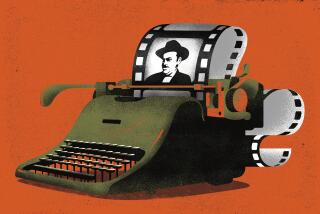A Tale of Two ‘Citizens’ : PBS Views Clash of Welles, Hearst as Epic Struggle
- Share via
“Boy Wonder and Terrible Tycoon Crash and Burn in Head-On Collision.”
A swell headline that pretty much covers the thesis of “The Battle Over Citizen Kane,” a fascinating and informative two-hour presentation filled with spicy interviews and rare clips that airs tonight as part of PBS’ “The American Experience” series.
And if the headline as well as the documentary hype the truth to make the story more exciting, that’s a situation both participants were intimately familiar with.
And “Battle” does convince you that it’s no accident that writer-director Orson Welles, still in his early 20s, chose 76-year-old publishing magnate William Randolph Hearst as the subject of his first film. They were both, the film’s narration by Thomas Lennon and Richard Ben Cramer tells us, “outsized Americans, proud, gifted, destructive--geniuses each in their own way.”
*
Perhaps one reason “Kane” was so good is that Welles had more of an instinctive affinity for Hearst than he cared to admit, a situation that also made it easier for Welles to place elements of his own life into the picture as well.
“He was doing an autobiographical film and didn’t realize it,” says director Robert Wise, “Kane’s” editor. “The arc of the two lives was very much the same.”
Hearst was America’s preeminent publishing tycoon, an imperial, imperious man who lived on a California estate half the size of Rhode Island and didn’t mind inventing the truth in his nationwide chain of papers. And he was not without his own flair for the dramatic and theatrical, as when he assigned a reporter to jump off a ferry in the San Francisco Bay to test the city’s rescue system.
As for Welles, he was a full-fledged mythologizer who found it tedious to tell the same story the same way twice. He embraced the new medium of radio in the same way Hearst had taken to newspapers, and was shrewd enough to schedule the martian landing part of his “War of the Worlds” broadcast just at the moment when listeners to rival Edgar Bergen would probably be switching stations.
Perhaps a collision between these two sacred monsters was an accident waiting to happen, but “Battle” posits that Welles made it inevitable by grossly slandering Hearst’s actress-mistress, Marion Davies, in the form of the screechy Susan Alexander of “Kane.”
The Marion Davies situation also shows “Battle’s” reluctance to give up on a good story when it conflicts with the truth. Though Welles himself says here that what he did “was something of a dirty trick,” this film prefers to concentrate on the way Hearst shoved Davies “down the public’s throats” than to fully acknowledge what silent film buffs have always known: The actress was enormously talented, one of the most truly gifted comedians of the era.
The same overreaching shows in the film’s take on the effect the clash between Welles and Hearst had on the director’s subsequent career.
While “Battle” expertly details how Hearst nearly succeeded in derailing the picture, it ignores the support the film did get (Hedda Hopper was a big booster). And it implies that “Kane’s” winning of only one Oscar was somehow the result of a Hearst-led cabal, slighting in importance the nine nominations the film did receive, no small amount, and ignoring the fact that the traditionally myopic academy doesn’t need political pressure to ignore greatness.
Also unconvincing is “Battle’s” screwy implication that the clash with Hearst was somehow the reason “The Magnificent Ambersons” was taken away from Welles. And portentous narrative lines like describing the freedom Welles got to make “Kane” as “the worst thing that could have happened to him” are as hyperbolic as any of Hearst’s headlines.
Welles’ inability to completely fulfill his extraordinary promise remains one of the most debated of Hollywood mysteries. This lively, informative film does itself and Welles a disservice by settling on so conveniently simple an explanation.
* “The Battle Over Citizen Kane” airs at 9 tonight and again Saturday at 7 p.m. on KCET-TV Channel 28. The Saturday telecast will be followed at 9 p.m. by “Citizen Kane.”
More to Read
Only good movies
Get the Indie Focus newsletter, Mark Olsen's weekly guide to the world of cinema.
You may occasionally receive promotional content from the Los Angeles Times.








